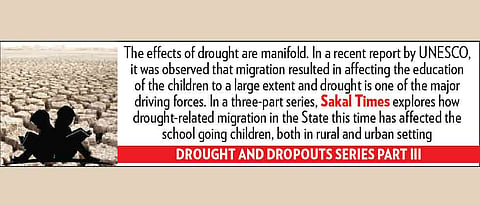

Pune: From trying to communicate with them by acquainting them with the local language to prepping them up for the school curriculum, several NGOs and organisations in the city and across the state are trying to help children from the migrant population to get connected with education again.
“It is a difficult task to find the children even in their homes, as most parents take them to their workplace. We have to find out the hours when they all are at home, talk to the parents and then take the children to schools,” said Suraj Mohite, Coordinator at IDEA Foundation that works for the migrant children in Bhor taluka.
The organisation helps the children get admitted to the nearby Zilla Parishad School, provide them with school kits and also aid them with remedial coaching.
Several organisations in the city are working especially at the construction sites, where a large number of migrant families live to earn their livelihood. “With drought across the state this year, we have seen a huge number of people coming in from places like Beed, Nandurbar, Latur etc. The migrants on the construction sites too are always on the move and we have observed that on an average, we get maximum of six-month period with these children. So accordingly, we have devised our curriculum,” Varsha Jadhav, Associate Director, Door Step School, which is an organisation that takes education to the marginalised children.
Jadhav further said, “In Pune, we are presently working at around 70 sites. We enrol the children between the age-group of six to 14 to the local schools. We emphasise on their admissions to the government-run schools alone, as no matter where they go, they will always find a government school and they should be used to this. We run a full-fledged nursery schools for those aged between three to six.”
She also said that the most important initiative is the day care centre that is run for the infants, as often, the older children are held back from going to schools to take care of the younger lot in the houses.
Apart from this, Door Step School also runs around six ‘Schools on Wheels’ in the city, to spot and teach the migrant and other marginalised children throughout the city.
However, there is almost no provision for transportation of these children, despite the RTE Act making it mandatory, said Manish Shroff of NGO New Vision.
“Most of the times, the schools are so far that the children are not able to make it there, despite being enrolled. Also, there should be Anganwadis near the construction sites and industrial areas, but it is hardly ever followed. In our initiatives, we run three different programmes for the children, according to their age-groups. We have a playgroup for the age-group of zero to three, nursery for the children between three to six. For those above six-years-old, we enrol them in the schools, after we conduct a bridge course for them,” Shroff added.
The bridge course helps these kids prepare for the school, learn Marathi and acquire the skills of reading and writing.
